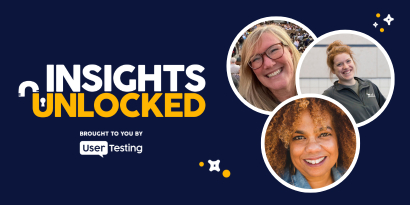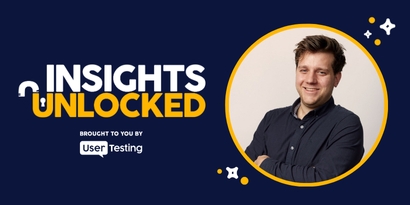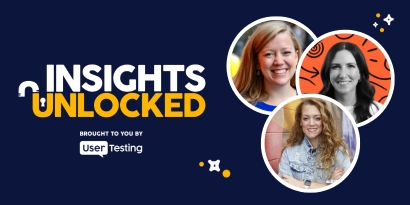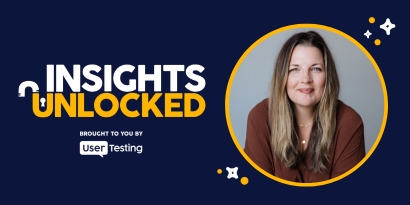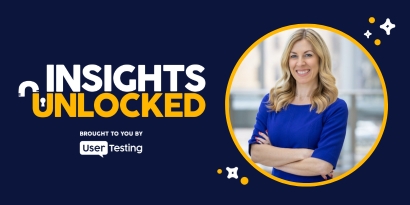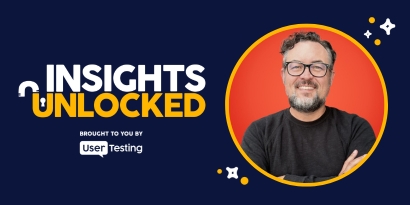
Episode 120 | June 03, 2024
The UX Research Reckoning one year later: Insights from Judd Antin on the Future of User Experience
UserTesting’s Andy MacMillan interviews Judd Antin on his article, "The UX Reckoning," and explores the future of UX research on this Insights Unlocked podcast.
The UX Research Reckoning one year later: Insights from Judd Antin on the Future of User Experience Research
The enemy of good products is confirmation bias, says Judd Antin, a product and UX research expert and ex-Yahoo, Meta and Airbnb.
“Because I think most people don't listen to their actual customers,” replied Andy MacMillan, UserTesting’s CEO. “They listen to the people in their circle who happen to be customers. … And most people aren't senior executives. The math on that is just bad.”
On this week’s Insights Unlocked, Judd and Andy discuss the future of UX researchers and their crucial role in bringing the customer’s voice and insights into organizations. Additionally, they discuss balancing micro and macro research approaches, the role of AI, and the critical importance of leadership in driving innovation and business value.
Judd Antin: A Leader in UX Research
Judd is an executive coach, consultant, advisor, writer, and teacher. He has led design and research teams at Yahoo, Meta, and Airbnb. His direct reports have also gone on to lead user research at Figma, Notion, Slack, Robinhood, Duolingo, AllTrails, and more.

The UX Reckoning: A Call for Change
Last year, Judd made headlines with his article, "The UX Reckoning Is Here," where he saw the way in which researchers have operated over the last decade needed a reset. This change, he contends, is essential to align more closely with business needs and demonstrate clearer value in driving strategic decisions and detailed user interactions.
So, what’s changed in the year since that first article was published?
“One good thing that's changed in the last year is there is now—I wasn't the first, remotely, to be talking about how important it is for researchers to be more focused on business value,” Judd said. “But now I would say it's a conversation that’s happening everywhere, at every level, in every way.”
The Importance of UX Research
In today's rapidly evolving digital landscape, UX research plays a pivotal role in shaping user experiences and driving business success. As organizations strive to better understand their users, the insights provided by UX researchers become invaluable.
The best researchers I work with end up building an incredible amount of intuition about the needs of the customer that are not met,” - Andy MacMillan
“I think the best researchers I work with end up building an incredible amount of intuition about the needs of the customer that are not met,” Andy said. “And that's often the next business opportunity, right? It's not just what the user's telling you, but it's also what you're learning about them over time. It's a real source of knowledge in the organization.”
In his article, Judd argues that UX research must shift from predominantly middle-range research to a more balanced approach that includes both micro (tactical) and macro (strategic) research. This transformation is essential to align more closely with business needs and demonstrate clearer value in driving strategic decisions and detailed user interactions.
Micro Research: Tactical Insights
Micro research focuses on close-to-the-ground, tactical work such as usability testing, user sessions, and eye-tracking. This type of research is crucial for making designs better, identifying bugs, clearing conversion bottlenecks, and clarifying user confusion.
“There’s no better place to be able to directly point to the way your work impacted the bottom line,” Judd said.
Andy added to that comment, “While [someone] might think of micro research as being one little decision, but what if you could set the team up to score and analyze and scale what you're doing, and then you can dive into those problems? And I think that's also a really interesting way to think about lots of small things adding up to having a big impact.”
“I really agree with that,” Judd said. “I think I have never seen a usability study that did not also yield useful aggregated insights that are at a mid- or high level. … If you're paying attention and you're doing the smart analysis, you get your cake and you can eat it too.”
If you're paying attention and you're doing the smart analysis, you get your cake and you can eat it too.” - Judd Antin
Macro Research: Strategic Alignment
And, Judd said, macro research, on the other hand, involves long-term strategic decisions that shape a company’s direction over 18 to 24 months. This approach helps UX researchers engage with executives and influence major strategic decisions.
“The best companies, I agree, are the ones who can set an 18- to 24-month strategy,” Andy said. “But they've got to build a look out to that horizon. … And I think that's a skill set that researchers have that maybe doesn't get used in that way nearly often enough.”

“Researchers are good at frameworks. And yet somehow we don't end up in this position where we're providing the scaffold for strategic decision making in focus,” Judd said. “We can be better at explicitly driving prioritization. And I think to do that, we have to get up off our high horse about users because—yes, users; yes, empathy—but also viability, feasibility, profit, all the other things that a business has to worry about.”
And researchers can earn credibility, Judd said, when they can say, ‘this is what we heard. These are the insights that we've got. Here's a framework.’
“And that framework is not so laser focused on users that we've forgotten it's actually about matchmaking,” Judd said. “It's about figuring out the intersection of what users want and what the business needs.
"We can be better at explicitly driving prioritization. And I think to do that, we have to get up off our high horse about users because—yes, users; yes, empathy—but also viability, feasibility, profit, all the other things that a business has to worry about.” - Judd Antin
Embracing AI in UX Research
Artificial intelligence (AI) is a hot topic across industries, and UX research is no exception. Judd provides a measured view on AI's impact, emphasizing that while AI can enhance the efficiency of researchers, it will not replace the need for human insight. AI tools can handle repetitive tasks and scale research efforts, allowing researchers to focus on more complex and high-value tasks.
“The way it might impact our jobs is like a researcher with those tools at their disposal can now do the work of 3 or 4 because we have the always-on assistant,” Judd said. “So, definitely becoming proficient with the latest generation of AI tools, the way that they can scale research practice is important.

“I think it's the same conversation that we've been having about democratization. ‘Should we, shouldn't we,’ which I think is silly because you can complain all you want, but the genie is not going back in the bottle. Like we have these tools at our disposal now. They will never not be at our disposal. So to stay relevant, we need to stay abreast of the tools, learn their pros and cons, use them to drive efficiency and scale and scope.”
"We have these [AI] tools at our disposal now. They will never not be at our disposal. So to stay relevant, we need to stay abreast of the tools, learn their pros and cons, use them to drive efficiency and scale and scope." - Judd Antin
Judd said researchers and research leaders need a mental shift, “where we have to think of ourselves as the product.”
“It is not just the value of the research and insights that we are delivering. It's you. A lot of good researchers are like, ‘Well, I need to differentiate between my opinions and the data I bring.’ Fair enough. But fundamentally I don't agree because of what you said, Andy, because the best researchers speak from evidence.
“But through the lens of their perspective, they are valuable precisely because they provide an intuitive reasoning on top of that data and on top of that insight which no AI will ever replace. So actually, we make ourselves easier to replace the more we just see ourselves as kind of purveyors of insight and not actually the source of the product ourselves.”
The Role of Leadership and Influence in UX Research
Building strong relationships and understanding the social dynamics within organizations are crucial for UX researchers aiming to influence decision-making. Judd shares practical advice for researchers at all levels on how to build influential relationships within their organizations.
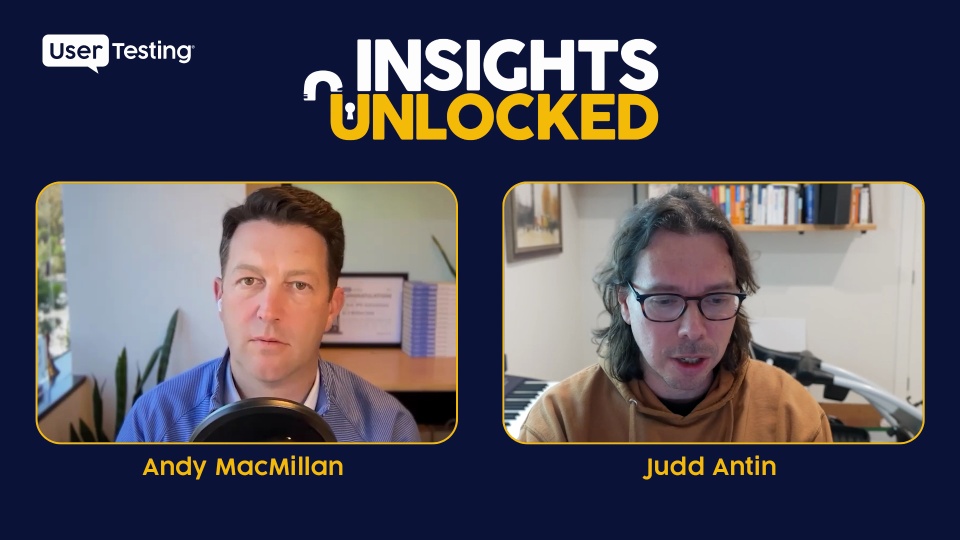
Use your research skills to understand and influence the social and organizational dynamics within your workplace. This internal application of research skills can lead to more effective decision-making and strategic alignment.
"We must view ourselves as integral to decision-making, not just purveyors of insight." - Judd Antin
Looking Forward: A Bright Future for UX Research
Despite current economic uncertainties, Judd remains optimistic about the future of UX research. He sees this as an opportunity for growth and evolution within the discipline. By aligning more closely with business goals and demonstrating clear value, UX researchers can secure their place as indispensable members of their organizations.
Conclusion
This episode of the Insights Unlocked podcast offers valuable insights into the future of UX research. Judd Antin’s perspectives on balancing micro and macro research, leveraging AI, and building strong leadership skills provide a roadmap for UX researchers aiming to elevate their impact within their organizations. As the UX research field continues to evolve, staying informed and adaptable will be key to success.
Episode links
- Medium: One Big Thought
- Website: JuddAntin.com
- LinkedIn: Judd Antin

